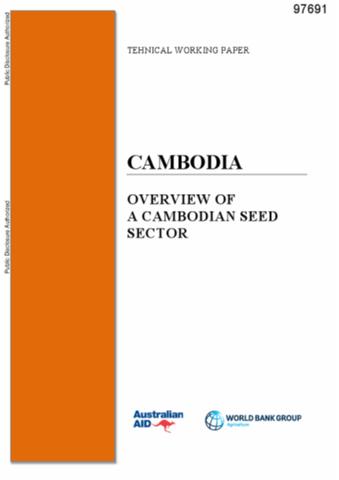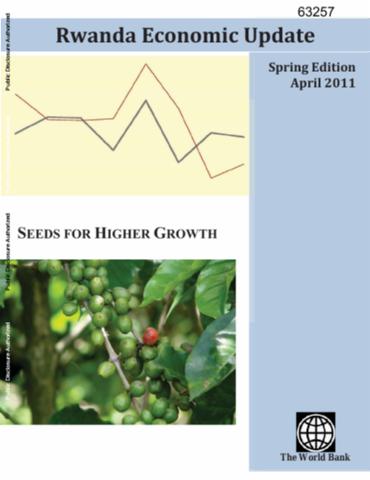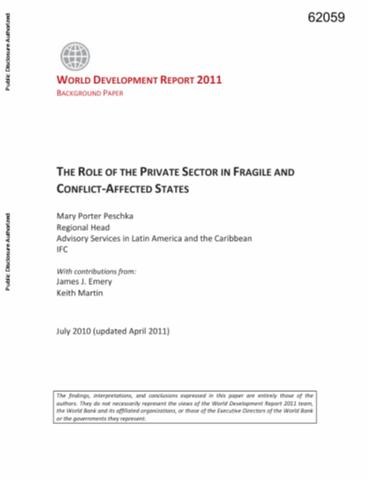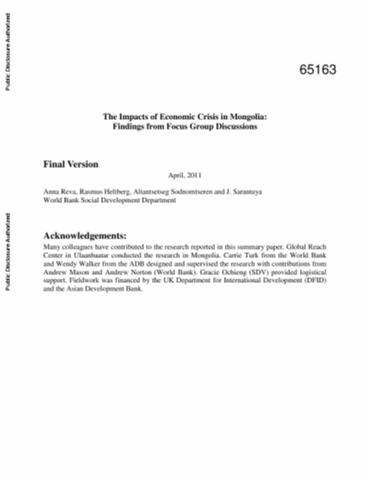Cambodia
The use of quality seed is a major component of increased yields in crop production. Quality seed and seed programs in a country does not emerge by happenstance; it is created by a combination of many factors that include variety development, seed production, quality control, processing, marketing, and governmental oversight. As the seed sector in a country matures, each of these factors becomes more important and plays a more important role in the growth of the agricultural sector. The seed program in Cambodia is interestingly different from that in many other developing countries.
Rwanda Economic Update, April 2011
The current edition of the Rwanda economic update is titled seeds for higher growth and specially features the agriculture sector. The importance of agriculture's contribution to growth in Rwanda remains considerable, despite the emergence of other significant growth drivers, such as services. Rwanda's agriculture sector will play an essential role in attaining the country's development vision of sustainable growth and increased poverty reduction, due to its employment weight.
The Role of the Private Sector in Fragile and Conflict-Affected States
This paper explores how the private sector can positively contribute to peace-building and conflict prevention, and how that positive private sector role can be supported and enhanced. The starting premise recognizes that the private sector exists in all conflict situations and has the potential to both exacerbate and ameliorate conflict, the outcome of which can be greatly affected by appropriate support from external partners.
The Impacts of Economic Crisis in Mongolia
Mongolia was hit hard by the global economic recession, notably the fall in commodity prices. Gross Domestic Product (GDP) contracted by 1.6 percent in 2009 after growth of 8.9 percent in 2008. The country is narrowly specialized in production of a few primary goods with minerals comprising 70 percent of total exports. Since mid-2008, the prices of main export goods, including copper, zinc, crude petroleum, combed goat-down and cashmere dropped by close to or more than 50 percent, though prices of coal and gold held strong.
Making CAADP Work for Women Farmers: A review of progress in six countries
Looks at CAADP plans in Nigeria, Malawi, Tanzania, Ethiopia, Kenya, Ghana, Zambia. Found systematic policy neglect of women farmers. Plans pay little attention to their needs and rights. Money for implementation is woefully inadequate.
Implications of agriculture transformation and farmers' mental health after adaptation to the climate change
Regional Law No. 28-Z “On allotment of land plots to multi-child families”.
This Regional Law sets forth the modalities of allotment in ownership free of charge of plots of land pertaining to public and municipal property to multi-child families, and also establishes minimum and maximum land areas of the aforesaid plots of land. Multi-child family shall be considered family with three or more children less than 18 years of age. The aforesaid plots of land in inhabited areas shall be allotted for housing construction and subsistence family farming. Allotment of the aforesaid plots of land shall be performed once-only.
The role of foreign investment in Ethiopia’s smallholder-focused agricultural development strategy
Examines political and social dynamics of foreign agricultural investment in Ethiopia. Concludes that this expansion is part of a government move towards an export-led development strategy, so the micro-benefits come at the cost of increased risks to those living in the vicinity of new investments, particularly politically marginalised pastoralist populations.
The social, political and economic transformative impact of the Fast Track Land Reform Programme on the lives of women farmers in Goromonzi and Vungu-Gweru Districts of Zimbabwe
Includes background; conceptual framework; methodology; research findings – security of tenure, cultural practices, gender inequalities, land utilisation, constraints to production, a passion for farming, gender bias against women farmers in access to and utilization of land; lessons learnt, recommendations.
Developing Zambia's agriculture: a hard road to hoe
Zambia’s small-scale farmers are even poorer today than they were 40 years ago. According to the 2010 Human Development Report, Zambia is one of just three nations whose development has fallen behind 1970 levels. And yet Zambia is one of Africa’s “lion states” with annual economic growth rates of more than 5 percent. It is not easy to explain such a contradiction, but a DIE study is drawing closer to ? nding an answer.
Carbon labels - pitfalls for developing countries?
Carbon labels for food are a new strategy of industrialised countries to reduce climate change-relevant gas emissions in agriculture. However, not every label includes the measurement of all emissions and may disadvantage and even exclude exporting farmers from developing countries. Policy-makers should reconsider this approach or at least focus on fair and non-discriminatory labels.








